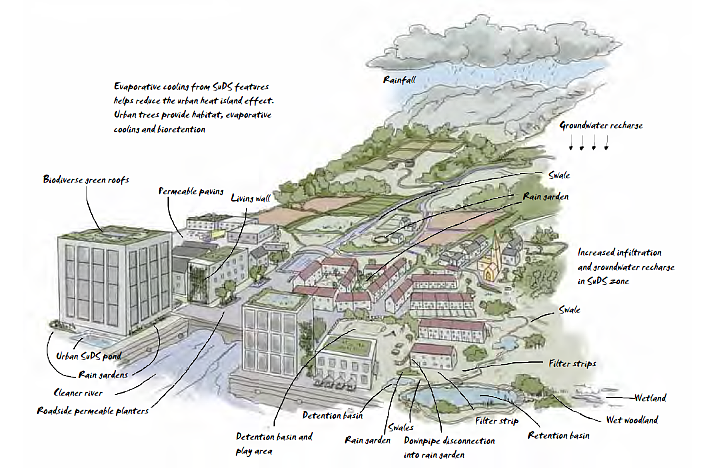Parliament pushes back on flood defence

Today, the EFRA Select Committee has reasserted the will of Parliament to insist once more that the Government takes action to reduce surface water flooding by including sustainable drainage in new developments.
For six years, a law has sat on the statute book that would reduce flooding and improve resilience when floods do take place. The Flood and Water Management Act 2010 included a requirement for sustainable drainage to be included in all new developments, but the Government chose not to implement the Act because of perceived costs to businesses.
Last year, WWT worked with a cross-party group of Peers to propose a change to the Housing and Planning Bill that would have brought all the benefits of SuDS without any of the bureaucracy. In a cross-party amendment sponsored by Baroness Parminter, Lord Krebs and Lady Young, the House of Lords voted twice to include the measures, but the Government twice rejected the proposals.
Sustainable drainage systems (SuDS) reduce flood impacts by using natural processes to soak away surface water, with benefits for biodiversity and water quality. We know (not least from Defra’s own evidence) that the costs are comparable with traditional sewer solutions. We know that the engineering expertise is available. We know that surface water flooding is a growing problem that will bring misery to millions of people unless we take action.
These major legislative moments join a chorus of insistence of the value of sustainable drainage by other select committees, the Committee on Climate Change, and NGOs.
Yet the Government continues to resist this clear case for change.
However, there is an opportunity on the horizon. Rather than pass the Lords’ amendment, the Government did agree to a review of SuDS law and policy. We welcome that review and look forward to the terms of reference, which are expected shortly.
Part of the problem is that we have no official data on the extent or quality of SuDS that are being deployed. The Government insists that planning rules will ensure SuDS are built, but our experience suggests that many developments are going ahead without decent natural flood relief measures. We are working with CIWEM and a splendidly diverse partnership to fill that gap.
But this review cannot be just about gathering numbers. It must also look at policy solutions, or many thousands more homes will be built that add to flood risk.
Today, the Committee’s recommendation gets to the heart of the matter, identifying that it is policy that stands in the way of SuDS deployment, not practicality. The Committee calls on Government to clarify responsibility for SuDS and ensure that policy is in place that will ensure SuDS are included in all new developments. We heartily support that recommendation.
Richard Benwell
Head of Government Affairs
